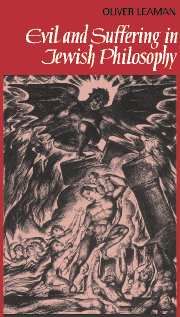8 - Cohen
Published online by Cambridge University Press: 24 October 2009
Summary
Once we get to Hermann Cohen (1842–1918) we see one of the successes of Mendelssohn's project. Cohen was an important interpreter of Kant and founded the Marburg school of interpretation, which had as its adherents a large body of the Kant scholars in Germany and further afield. He was working at a time when Jews were becoming very thoroughly assimilated into German society, often at the expense of their religion. Unsurprisingly, Cohen regards religion from a Kantian viewpoint, and in his books on Jewish topics he interprets the Bible as largely a practical guide to action. As a socialist, he has a rather optimistic view of history and he sees the development of Judaism as a revolt against idolatry and all that goes with it. What goes with it is a particularity which stands in the way of progress and enlightenment, and Judaism represents the journey into the light of improvement and the taking up of moral and intellectual burdens as free agents. This is not to say that Judaism is the only such route, but historically it played a vital part in the construction of modernity, according to Cohen. Like Maimonides, he spends a lot of time discussing the purpose of particular religious rituals and biblical passages, with the emphasis generally being on their practical value in the formation of a worthwhile lifestyle.
Hermann Cohen followed Mendelssohn in trying to demonstrate the rationality of Judaism, and also tried to demonstrate its compatibility with Kant's philosophy. The basis of religion is taken to be not revelation as such, but rather the way in which revelation presupposes a notion of moral perfection, a means for the agent to express his autonomy despite the vagaries of the world.
- Type
- Chapter
- Information
- Evil and Suffering in Jewish Philosophy , pp. 157 - 164Publisher: Cambridge University PressPrint publication year: 1995

